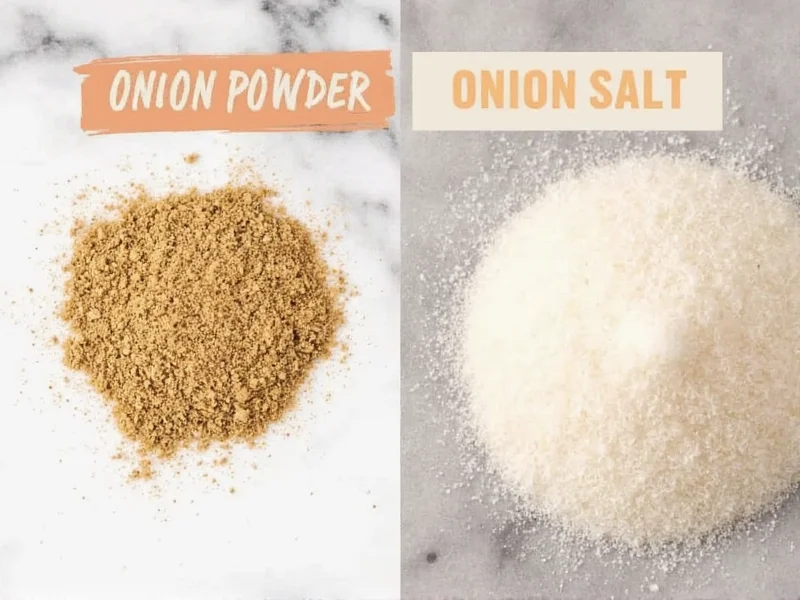Understanding the Core Differences
When comparing onion powder vs onion salt, the primary distinction lies in their composition. Onion powder consists solely of dried, ground onions that have been dehydrated and pulverized into a fine powder. This pure form preserves the sweet, pungent flavor of onions without any additional ingredients. Onion salt, however, blends onion powder with table salt—usually at a ratio of three parts onion powder to one part salt. This combination creates a convenient seasoning that delivers both onion flavor and sodium in a single ingredient.
Composition and Manufacturing Process
Manufacturers produce onion powder by dehydrating fresh onions at low temperatures to preserve flavor compounds, then grinding them into a consistent powder. The process removes moisture while concentrating the natural sugars and sulfur compounds that give onions their distinctive taste. Onion salt follows the same initial process but adds salt during the final blending stage. Some commercial varieties also include anti-caking agents like calcium silicate to prevent clumping.
| Characteristic | Onion Powder | Onion Salt |
|---|---|---|
| Primary Ingredients | 100% dehydrated onions | Approximately 75% onion powder, 25% salt |
| Sodium Content | Negligible (about 5mg per teaspoon) | Approximately 480mg per teaspoon |
| Flavor Profile | Pure onion flavor, slightly sweet | Onion flavor with pronounced saltiness |
| Best For | Recipes requiring precise salt control | Quick seasoning of meats and vegetables |
| Substitution Ratio | Use 1:1 for pure onion flavor | Reduce additional salt by 1/4 tsp per tsp used |
Flavor Impact in Cooking
The flavor difference between onion powder and onion salt significantly affects recipe outcomes. Onion powder provides a concentrated but clean onion essence that blends seamlessly into sauces, dressings, and spice rubs without altering sodium levels. Chefs prefer it for dishes where they want to control salt independently, such as in soups, stews, and homemade spice blends. Onion salt works best when you need simultaneous seasoning and flavor enhancement—think grilled meats, roasted vegetables, or savory snacks where the salt component enhances texture and caramelization.
Understanding onion powder vs onion salt in recipes prevents common kitchen mistakes. Many home cooks accidentally over-salt dishes by substituting onion salt for onion powder without adjusting other salt ingredients. When substituting onion salt for onion powder, reduce additional salt by 1/4 teaspoon for every teaspoon of onion salt used. Conversely, when replacing onion salt with onion powder, you'll need to add salt separately to achieve balanced seasoning.
Practical Usage Guidelines
For baking applications like savory breads or biscuits, onion powder typically performs better because its pure flavor won't interfere with yeast activity or dough chemistry. In meat rubs and marinades, onion salt creates a more complex crust due to the salt's moisture-drawing properties. When making homemade versions, combine three parts onion powder with one part fine sea salt for a quality onion salt substitute.
Storage considerations differ slightly between these seasonings. Both should be kept in airtight containers away from light and moisture, but onion salt may clump more readily in humid environments due to its salt content. Properly stored, onion powder maintains peak quality for 2-3 years, while onion salt remains fresh for 18-24 months before flavor degradation occurs.
Health and Dietary Considerations
For those monitoring sodium intake, onion powder offers a significant advantage as a flavor enhancer without added salt. This makes it preferable for heart-healthy cooking or when preparing meals for individuals with hypertension. The onion salt to onion powder conversion becomes crucial in dietary planning—using onion powder allows cooks to control sodium levels precisely while still achieving robust onion flavor.
Creating Balanced Seasoning Blends
Professional chefs often keep both seasonings on hand for different applications. When developing spice mixes, onion powder integrates more predictably into complex blends since its flavor won't be overshadowed by salt. For finishing dishes or adding quick seasoning during cooking, onion salt provides immediate flavor and seasoning in one step. Understanding when to use onion powder instead of onion salt can transform ordinary recipes into restaurant-quality dishes through better flavor layering and seasoning control.
Frequently Asked Questions
Can I substitute onion powder for onion salt in recipes?
Yes, but you must adjust salt levels. Replace each teaspoon of onion salt with 1 teaspoon of onion powder plus 1/4 teaspoon of salt. This maintains proper seasoning balance while preserving the onion flavor profile in your dish.
Which has stronger flavor: onion powder or onion salt?
Onion powder delivers more concentrated onion flavor since it contains no diluting salt. Onion salt's flavor is milder per volume because salt makes up 25% of its composition. For pure onion taste intensity, onion powder provides stronger flavor impact.
Does onion salt contain actual onion pieces?
No, quality onion salt contains only finely ground onion powder blended with salt. The manufacturing process ensures complete integration, so you won't find visible onion particles. Lower-quality products might show slight color variations, but no discernible onion pieces should be present.
How do I make homemade onion salt?
Combine three parts onion powder with one part fine sea salt in a bowl. Mix thoroughly until uniform in color. For better flow, add 1/4 teaspoon of cornstarch per cup of mixture. Store in an airtight container away from light and moisture for optimal freshness.
Why do some recipes specifically call for onion powder instead of onion salt?
Recipes specify onion powder when precise salt control is crucial, such as in baking, canning, or dishes with other salty ingredients. Using onion powder allows chefs to manage sodium levels separately while still incorporating onion flavor, preventing accidental over-salting that could occur with pre-mixed onion salt.











 浙公网安备
33010002000092号
浙公网安备
33010002000092号 浙B2-20120091-4
浙B2-20120091-4